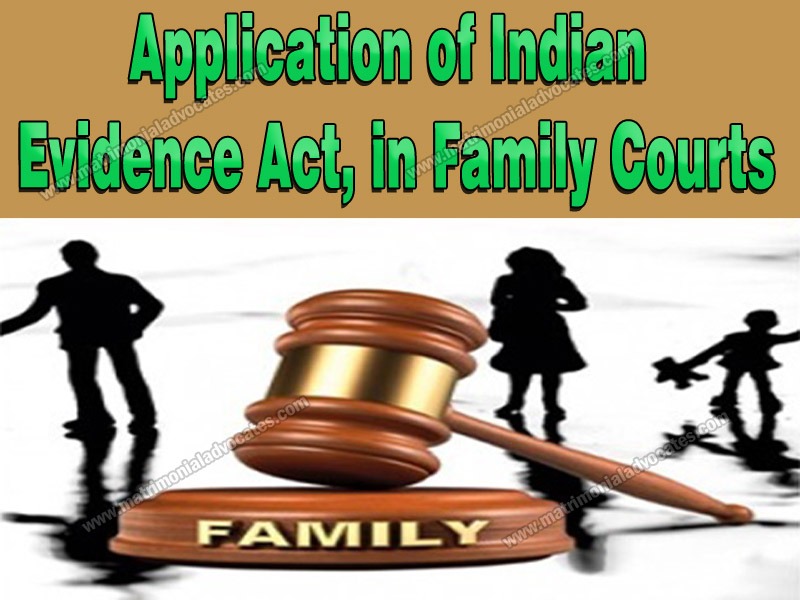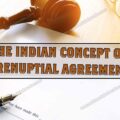
“This article addresses the Application of Indian Evidence Act, 1872 that is mentioned in the Section 14 of the Family Law. Before we discuss this section we must know what Section 14 of the Family Law talks about.”
SECTION 14
APPLICATION OF INDIAN EVIDENCE ACT, 1872
“A Family Court may receive as evidence any report ,statement ,document, information or matter that may ,in its opinion, assist it to deal effectually with a dispute, whether or not the same would be otherwise relevant or admissible under the Indian Evidence Act, 1872 (1 OF 1872).”
RIGOR OF EVIDENCE ACT, 1872 (Not Applicable)
Rigor of Evidence Act, 1872 is not applicable in Family law i.e. the evidence that is barred in other laws may be admissible in Family Court.
In the case of Narayan Roy v. Jamuna Dey (Roy)[1]
Party was not entitled to be represented by legal practitioner, as of right in proceeding before Family Court. As such Presiding Judge was required to be more careful in dealing with proceeding before him. Moreover almost all parties in such proceedings were not legally trained.
In other case of Shivanand Damodar Shanbhag v. Sujata Shivanand Shanbhag [2]
It was held that family court is competent to receive document though not proved as per strict proof, as per Evidence Act.
Consideration of Evidence by Family Court
Provided under the Evidence Act, 1872 the Family Court is not restricted by rules of relevancy or admissibility. In the case of Sagarika Debata v. Satyanarayan Debata [3]
Appellant had categorically admitted regarding her relationship with respondent no.2 in proceeding before Court of Inquiry of Air Force. She had never raised complaint before authorities conducting Court of Inquiry of having been coerced to make such admissions. There was no infirmity in finding of Trial Court that appellant herself had admitted adultery with respondent no.2.
COURT’S DUTY
The duty of the court is to see whether all the material facts are brought in evidence. In case the parties need guidance than the guidance must be provided by the family court judge himself.
In the case of Rajesh Francis v. Preethi Roslin[4]
It was held that the proof of validity of marriage as sine qua non could be permitted to be ignored by Family Court, being fundamental and basic stipulations of law which are substantive in nature.
PRINCIPLE OF ADMISSIBILITY OF STATEMENTS AND DOCUMENTS
The Family Court has been left free to receive any evidence or material which assists it to deal effectually with a dispute and the provisions of the Indian Evidence Act would not be applicable. For ensuring speedy disposal it has been thought that the Family Courts should not enter into legal rigorous and also the complicated principles about the admissibility of documents under the Indian Evidence Act.
The guidance has to be provided by the Judge Family Court himself. In order to obviate the difficulty of the parties themselves as to what evidence would be admissible strictly under the Indian Evidence Act, the Family Court has been given a free hand to receive the report , statements, documents, information or any other material in evidence which may assist in effectually dealing with the dispute.
TECHNICAL ASPECT TO BE IGNORED
Section 14 of the Family Court Act provides for exception to the general rule of evidence regarding admissibility of statements and documents if permissible by the court etc.
“It has been provided that looking to the nature of the cases which are decided by the Family Courts. The Court should not go into the technicality and should take a decision on the material before it in a broad manner. “
In the case of Manohar Lal Agrawal v. Santosh[5]
It was held that the parties appear before the Court personally and advocates are not allowed hence the technical aspect is to be ignored and whatever material is placed before the court, which it considers necessary to assist it and to deal with it effectively can be looked into. Section 14 is a special legislation and the principles of admissibility of documents as provided under the Evidence Act are not relevant in such cases.
CONCLUSION
We can conclude that the
Family Court has been enacted so that the disputes within the family may get
priority and be disposed expeditiously. Section 14 is a special legislation as
under this the Family Court has been left free to receive any evidence or
material which assists it to deal effectually with a dispute and the provisions
of the Indian Evidence Act would not be applicable. The court has to ignore the
technical aspect and should take decision on the material before it in broad
based manner.
[1] AIR 2010 Gau 75 (Agartala Bench)
[2] III (2013) DMC 263 (BOM) (DB)
[3] I (2011) DMC 82 (Ori) (DB): AIR 2010 Ori 58
[4] III (2012) DMC 228 (Ker) (DB)
[5] II (1993) DMC 202:1993 (2) WLC 70(Rajasthan)





